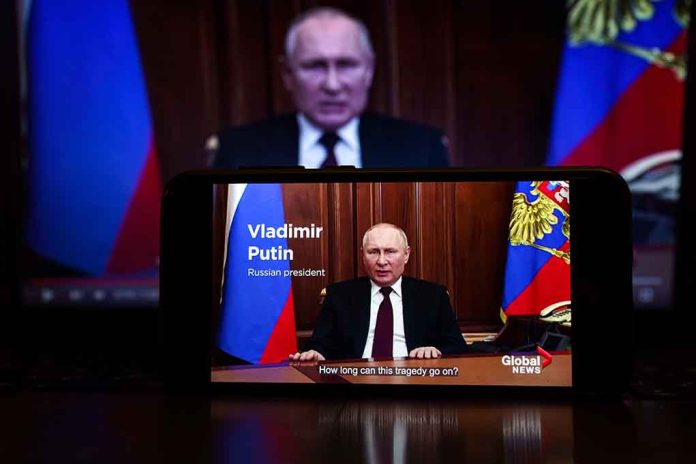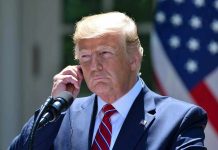
Putin deploys his personal guard unit to the Ukrainian battlefield as Russian forces face mounting losses and stalled progress in the strategic town of Chasiv Yar.
Key Takeaways
- Russia has deployed its elite FSB Presidential Regiment to the Chasiv Yar front line, typically reserved for ceremonial duties and direct protection of Putin.
- The deployment alongside the 98th Airborne Division signals Russia’s growing frustration with stalled progress in the strategically important Donetsk region.
- Ukrainian forces report highly coordinated and precise combat actions from these elite specialists, indicating a significant escalation in Russian tactics.
- Military analysts view this deployment as an attempt to intimidate Ukraine and project an image of Russian military superiority despite battlefield setbacks.
- The Presidential Regiment’s involvement demonstrates Russia’s determination to seize additional Ukrainian territory despite lacking capacity for significant advances.
Putin’s Ceremonial Guards Enter Combat
In a telling sign of Russia’s military struggles in eastern Ukraine, President Vladimir Putin has deployed his elite FSB Presidential Regiment to the front lines near Chasiv Yar. This unprecedented move involves forces typically reserved for guarding the Kremlin and performing ceremonial duties at state functions. The deployment marks a significant escalation in Russia’s approach to capturing the strategically vital town in Ukraine’s Donetsk region, where Russian forces have been stymied for over a year despite repeated attempts to break through Ukrainian defenses.
“The 98th Airborne Division is positioned opposite us—this is a very strong enemy. And in recent weeks, a new force has been added that significantly bolsters them. This is the separate FSB Presidential Regiment. These are top-level specialists. We’re now facing extremely intense combat and highly precise, deliberate actions,” Said Ivan Petrychak, Ukrainian military spokesperson.
The FSB Presidential Regiment’s deployment effectively confirms Russia’s struggle to achieve meaningful progress in Chasiv Yar, a town that has become a critical defensive position for Ukrainian forces. According to military analysts, the town’s elevation and strategic location allows Ukrainian defenders to inflict substantial losses on advancing Russian troops, creating a bottleneck that has frustrated Moscow’s objectives in the region. This elite unit reports directly to Putin himself, highlighting the Kremlin’s growing concern with battlefield performance.
Strategic Importance of Chasiv Yar
Chasiv Yar has emerged as a crucial battleground in Russia’s ongoing efforts to secure complete control of the Donetsk region, which it has partially occupied since 2014. The town sits on high ground overlooking key supply routes and serves as a gateway to larger Ukrainian-held cities further west. Russian forces have been attempting to capture this strategic position for over a year, but Ukrainian defenders have maintained a stubborn and effective resistance, forcing Moscow to commit increasingly elite and specialized units to the fight.
“The Russians are struggling to take Chasiv Yar, so they were forced to bring in their most capable forces for urban combat,” explained Ivan Petrychak, Ukrainian military spokesperson.
Reports from the battlefield indicate that Russian tactics have evolved but still failed to breach Ukrainian defensive lines. Ukrainian forces have reported that contrary to Russian claims of temporary ceasefires, combat operations have continued unabated with heavy artillery, drone strikes, and ground assaults. The Kremlin’s decision to commit the Presidential Regiment suggests a growing desperation to show progress after months of costly but largely ineffective operations in the area.
A Signal of Russian Desperation
The Institute for the Study of War (ISW) has assessed that the deployment of the Presidential Regiment represents more than just a tactical adjustment. According to their analysis, this unprecedented commitment of forces normally reserved for protection of the Russian leadership and ceremonial duties indicates significant pressure within the Russian military command structure to demonstrate progress. The regiment, approximately the size of a motorized rifle brigade, consists of both conscripts and contract soldiers with specialized training.
“The Russian military command’s decision to deploy the Presidential Regiment to fight in Ukraine is likely part of a larger Russian effort to intimidate Ukraine and the West through intensified battlefield activity and portray Russian forces as elite and fully capable of achieving significant successes in Ukraine in the near future” Stated by, ISW
The decision comes amid reports that other Russian special forces units are suffering from depleted manpower. Lieutenant General Apti Alaudinov recently confirmed that many members of the “Akhmat” special forces are currently recovering from lung damage sustained during operations in Ukraine’s Kursk region, with most of the “Aida” detachment still receiving treatment. These personnel shortages may have contributed to the decision to deploy the Presidential Regiment to bolster Russian capabilities in what has become an increasingly difficult and prolonged campaign.
Implications for the Conflict
Military analysts view this deployment as indicative of Russia’s broader strategic challenges in Ukraine. Despite committing substantial resources and manpower to operations in eastern Ukraine, Russian forces have struggled to achieve meaningful territorial gains in recent months. The ISW assessment concludes that Russian forces currently lack the capacity for significant battlefield advances, suggesting that the deployment of elite units like the Presidential Regiment represents an attempt to compensate for broader operational deficiencies.
“primarily responsible for fulfilling honor guard duties at state functions and guarding Russian officials, the Kremlin, and the Eternal Flame at the Tomb of the Unknown Soldier near the Kremlin Wall ” Stated by, President Putin
As fighting intensifies in Donetsk, Ukrainian President Volodymyr Zelenskyy has proposed face-to-face peace talks with Putin in Istanbul, though the Kremlin has not yet confirmed attendance. Ukrainian presidential adviser Mykhailo Podolyak made it clear that Zelenskyy would not meet with any Russian representative other than Putin himself, underscoring the high-level nature of any potential negotiations. Meanwhile, as Russia continues to commit increasingly elite forces to the battlefield, the conflict in eastern Ukraine appears poised to escalate further in the coming weeks.




